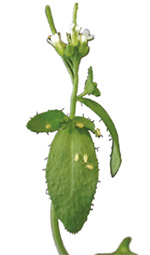Protein against peach potato aphid discovered
 peach potato aphids mean nightmares for farmers. The pests affects hundreds of economically important plants including rice, mustard, potato and tobacco. A research team from Kolkata has identified a leaf protein in garlic that shows promising results in eliminating these aphids. Known as Allium sativum leaf lectin (asal), the protein is coded by a gene also called asal.
peach potato aphids mean nightmares for farmers. The pests affects hundreds of economically important plants including rice, mustard, potato and tobacco. A research team from Kolkata has identified a leaf protein in garlic that shows promising results in eliminating these aphids. Known as Allium sativum leaf lectin (asal), the protein is coded by a gene also called asal.
The team from Kolkata-based Bose Institute has produced a transgenic tobacco plant by inserting the asal gene into tobacco. "When peach potato aphids were allowed to feed on asal-induced transgenic tobacco plants, aphids' population was drastically reduced,' says Sampa Das, the lead researcher."The percentage of insect survival decreased significantly to 16 per cent in transgenic asal tobacco plants and approximately 75 per cent of insects survived on control (non-transgenic) plants after 144 hours,' she adds.
According to Das, the observed insecticidal activity of asal protein in the present study opens up the possibility of introducing the gene into other economically important crop plants that are damaged by such insect pests. "asal proves itself as a potent candidate protein,' says Das. The findings of the study have been published in the Plant Biotechnology Journal (Vol 3 No 6).
Using a special technique of genetic engineering, the Kolkata team developed transgenic tobacco plants of which six independent lines, as1, as3, as5, as8, as11, and as12 were analysed extensively. The primary transformed line, as11 and its progeny plants, showed the highest expression of asal protein. The levels of the protein in transgenic plants were estimated to be in the range of about 0.68-2 per cent of the total soluble protein. The number of immature aphids (nymphs) produced per plant was reduced by 66 per cent in as11 and between 64 and 73 per cent in the progenies compared with control plants.
Studies show that asal crosses the gut membrane and then reaches the ovary of aphids. The presence of asal in the ovary may play a role in reducing the fecundity of the insects feeding on asal-expressing tobacco plants. Aphids are known to build up a huge population within a very short span of time. "So, the reduction in fecundity by asal-expressing plants is of considerable significance in controlling the rapidly growing aphid population,' says Das.
